“We live in a different time than we lived in a year ago,” says Elisabeth Moss. “And I wish we were sitting here talking about this dystopian fictional world, and how glad we are that we’re not in that, because we have a female president. I wish that were the conversation.”
Instead, we are sitting in the library of a London hotel, and I am showing the actor – who, until now, has been best known for playing Peggy Olson, the secretary who smashed though the glass ceiling of the advertising industry to become a highly respected copywriter – a meme that perfectly encapsulates the colossal leap backwards that half the population has suffered in the past 12 months.
Under the caption “2016”, the split-screen shows Peggy sashaying down the corridor at McCann Erickson for the last time, shades on, cigarette in mouth, the epitome of emancipated womanhood. Next to it, underneath “2017”, it shows Moss in her latest on-screen incarnation, clad in an archaic-looking blood-red robe and white, winged bonnet.
As Offred, the protagonist in The Handmaid’s Tale, 34-year-old Moss has dramatically cast off her iconic Mad Men character of seven years. And while there are numerous elements contributing to the febrile excitement about the new series, the frenzy is, in large part, thanks to the political context in which it is being consumed lending it a truly chilling level of prescience.
“There are themes that we thought were going to be relevant, like genital mutilation, human trafficking, child trafficking, rising rates of infertility, global warming,” says Moss, who is also a producer on the show. “But then, in my country, things got very, very relevant, much closer to home than we could have ever anticipated.” She leans forward across the plump red sofa we are sharing. “And that is something that we don’t take any joy from.”
The Handmaid’s Tale, based on the Margaret Atwood novel from 1985, takes place in the fictitious Republic of Gilead, an authoritarian regime that has overthrown the United States government. A far-right religious extremist group, opposed to what they saw as the corruption in modern society, assassinated the president and slaughtered Congress, putting the blame on Islamic terrorists. They then suspended the constitution and all women were fired from their jobs; women in Gilead are now no longer even allowed to read or write.
As Atwood herself commented recently in the New York Times Book Review: “Back in 1984 [when she began writing it], the main premise seemed – even to me – fairly outrageous. Would I be able to persuade readers that the United States had suffered a coup that had transformed an erstwhile liberal democracy into a literal-minded theocratic dictatorship?”
That would appear no longer to be a question. “Our rights are under threat in a way they have never been before. Or certainly, that they haven’t been in our lifetimes,” says Moss.
In the world imagined by Atwood, environmental toxins have reduced the birth rate to virtually zero, and Gilead ruthlessly divides women according to their reproductive capabilities. The elite of the regime have fertile females assigned to them as Handmaids, who are forced to bear children for the barren wives of the Commanders of the Faith. They are stripped of their names, identified only by the man they serve – Offred is “Of Fred”.
At the show’s premiere, at New York’s Tribeca film festival in April, Moss was asked whether she considered it to be a feminist work. “For me, it’s not a feminist story. It’s a human story because women’s rights are human rights,” she said. “I never expected to play Offred as a feminist.” The internet exploded in indignation at her apparent refusal to claim the F-word.
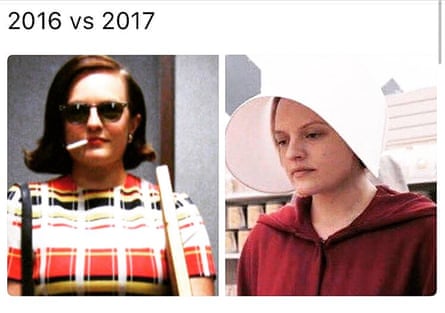
Today, she is keen to clarify that point. “What I meant to say was that, for me, feminism is equal rights for men and women,” she says. “Men and women are both humans, so, for me, that makes my characters and the work that I do human stories.” She pauses. “I play a fucking sexual slave, I play a breeder, a host, a woman for whom all of her rights, and all of her family and friends, have been taken away. She has nothing. So, yes, it is a feminist story.
“I spent seven seasons on Mad Men, playing what became considered a very feminist character,” she continues. “I was constantly being asked about feminism. And I could have, at that time, said what I said at Tribeca and it would have been fine.” That, she now knows, is no longer the case. “As a woman, now, you have to speak up,” she implores. “You have to own it [feminism] in a way that you never have before. It is different now.”
What is perhaps most terrifying about the show’s prescience is the idea we could casually sleepwalk into disaster. Early in the first episode, in language eerily resonant of the US post-election mantra to “Stay Woke”, Offred states: “Now I’m awake to the world. I was asleep before. That’s how we let it happen.” I quote this to Moss, who continues the line: “We didn’t look up from our phones until it was too late …
“I have had too many instances recently when I have walked past men carrying machine guns down the street,” she continues, shaking her head in horror. “When does that become normal? How long does it take before we stop noticing, and we no longer ask why there are men with machine guns around? People have to stay awake. And after you wake up, you should get out of bed and start doing things. There is no time later. My worst fear is that people become complacent, and apathetic, again.”
If it seems overly dramatic to draw such close parallels between Gilead and our current political climate, Moss would also like you to consider this: “Margaret [Atwood] talks about how a new regime, in order to take over, infiltrates itself into the government, into the existing regime, for quite a while before they make the flip, and the coup happens,” she says.
The suppression of freedoms in the US did not begin on 20 January 2017. Trump may have, loudly, issued 29 executive orders in his first 100 days, many of which aim to curtail the rights of swaths of minority groups, but he did not, alone, conjure the political climate in which they were announced.
Bruce Miller, who created The Handmaid’s Tale for the screen, believes that even if Clinton had won, the show – which was written before the US primaries even began, and filmed during the turbulence of the election and inauguration – would of course, be consumed in a different context, but not necessarily one of equality.
“Considering the venom with which she was attacked, that was purely coming from a sexist place, that would only have become more virulent had she been in office,” he tells me. “If Hillary had won, it would have been those on the right that felt there was some sort of evil empire in charge.”

And as Moss, who campaigns on behalf of Planned Parenthood, points out, “The rolling back of reproductive rights is not a new concept in the last six months.”
Since the beginning of 2011, when many aggressively anti-choice lawmakers swept into statehouses around the US, hundreds of new restrictions on abortion and access to birth control have been introduced across the country. That Roe v Wade, the Supreme Court decision that legalised abortion in the US in 1973, could be reversed, is a very real threat.
At the other end of spectrum, the commodification of fertility, which is taken to a horrifying conclusion in The Handmaid’s Tale, has become somewhat the norm. Egg-freezing cocktail parties are held in New York by profit-driven clinics; tourists pay women in developing countries to become surrogates; and “baby farms” have been reported in some parts of the world.
Later this summer, Moss will be seen in the second instalment of BBC2’s award-winning neo-noir miniseries Top of the Lake, in which one storyline also features the practice of forced, illegal surrogacy. “I am literally working with all of the same subjects,” laughs Moss. “It’s not intentional on my part. I just think that good stories are stories that reflect ourselves back at us, and each other.”
Atwood recently revealed that she adhered to a rule when writing the original text, that she “would not put any events into the book that had not already happened in what James Joyce called the ‘nightmare’ of history”. Miller made the same rule for himself in creating the show, which includes the practice of female genital mutilation and hanging, both as punishments for homosexuality.
“If you start inventing cruelties towards women, it becomes pornography, so you should look to the real world, where there are plenty of horrible examples we can use,” he says. “One of the biggest things we changed is the way our show deals with colour,” he continues. “In the book, it is an all-white world. It was more interesting to me to have a world where fertility trumps everything, and see how that resonated through society.” (#FertilityFirst, Moss and I agree, would be the hashtag for Gilead, were the regime on social media.) Miller points to interracial adoptions as a real-world example of that happening already, even in evangelical Christian communities, which, he says, “have some aspects of Gilead”.
Back in the hotel library, Moss is detailing her extensive list of upcoming projects, which includes not only a second season of The Handmaid’s Tale, but also Fever, a miniseries based on the story of Typhoid Mary, the first known carrier of typhoid fever in New York in the 1900s. Moss developed the show herself from a book and shopped it around the studios, to mixed, often shockingly sexist responses. “The feedback we got from some networks was that it was ‘a bit female’,” she says. “My jaw dropped to the floor. You can think that, but you definitely can’t say it out loud, and it’s also just insane and dumb. Because look at what has happened with The Handmaid’s Tale.”
She grins, possibly thinking about its popularity. “They can go fuck themselves.”
What Elisabeth did next Top of the Lake: China Girl
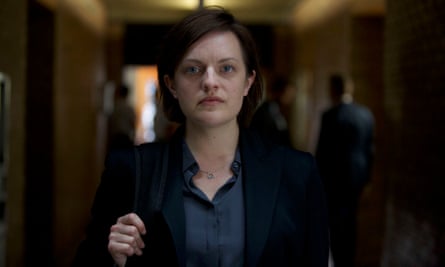
Once more, Detective Robin Griffin (Moss) must endure the deep-rooted sexism of the male-dominated Oceanic police forces. This time around, however, she must also contend with the horrifying misogyny displayed by a group of men who gather in a Sydney coffee shop to compare and rate their experiences with local prostitutes.
“There are men like that. Jane [Campion, the show’s creator] got it from fact,” says Moss. “They go online, they rate the women, and they even recommend where there is good parking around that brothel. The fact that prostitution is legal in Australia is something that is very foreign to me,” she continues. “I think that people should absolutely be allowed to do whatever they want with their bodies, and to live the life they want to lead. But I don’t necessarily believe that a lot of those women are choosing that lifestyle, especially the women who are from poorer countries and don’t have many other opportunities.”
She notes that the high-ranking Australian detectives who served as consultants for the show report that the ugly byproducts of legal prostitution often include human trafficking, drugs, disease and murder. “Maybe it’s not the men sitting around the table rating the girls who are committing the crime and doing the trafficking, but we all have to take responsibility for our actions, don’t we? You can’t just say, ‘That’s not my problem.’ Not any more.”
The Handmaid’s Tale continues on Channel 4, Sunday 11 June, 9pm; Top of the Lake: China Girl airs on BBC2 this summer


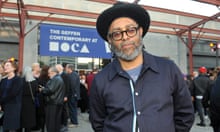

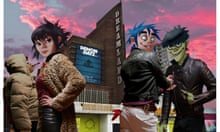
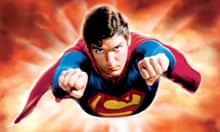



Comments (…)
Sign in or create your Guardian account to join the discussion